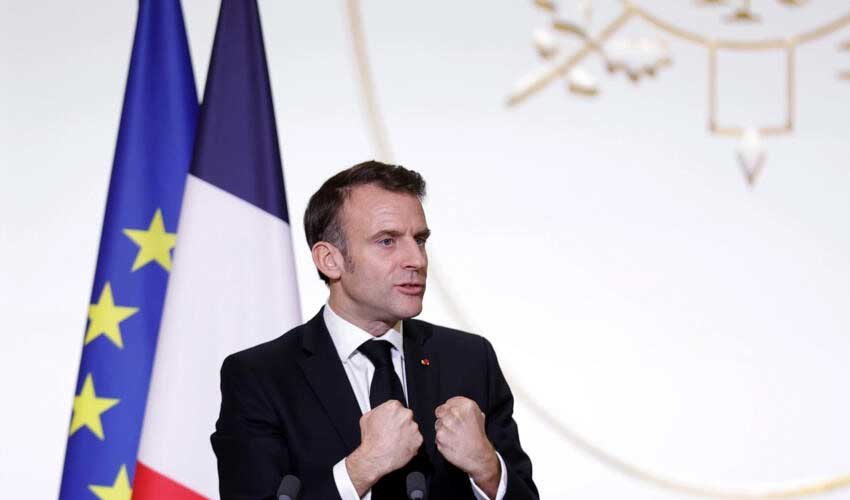French President Emmanuel Macron has warned that the United States and Europe risk losing their global credibility and being accused of “double standards” if they fail to resolve the ongoing conflicts in Ukraine and Gaza, urging the West to act swiftly and consistently to preserve international trust.
Speaking at the Shangri-La Dialogue, an annual high-level defense summit in Singapore, Macron called for a new strategic alliance between Europe and Asian nations to safeguard sovereignty and avoid becoming “collateral damage” in the great power rivalry between the US and China.
“If Russia is allowed to take Ukrainian territory without restriction or consequence, what message does that send to the world? What would happen if similar aggression takes place in Taiwan or the Philippines?” Macron said, pointing to the broader implications of the war in Ukraine for global stability.
“What is at stake in Ukraine is our common credibility — the credibility that we are still able to preserve territorial integrity and the sovereignty of people. No double standards,” the French leader said, addressing a room that included US Defence Secretary Pete Hegseth and military officials from across the Asia-Pacific.
Turning to the Middle East, Macron acknowledged perceptions that the West has given Israel a “free pass” amid the devastating conflict in Gaza. While he condemned the October 7 attacks by Hamas, he also stressed the need for a ceasefire and the recognition of a Palestinian state.
“If we abandon Gaza and continue to turn a blind eye, we kill our own credibility in the rest of the world,” Macron warned. “There cannot be one standard for Ukraine and another for Palestine.”
France is set to co-host a United Nations conference next month with Saudi Arabia aimed at reviving the two-state solution. The move has drawn sharp criticism from Israel. The country’s foreign ministry recently accused Macron of “rewarding jihadist terrorists” by pushing for Palestinian statehood. Prime Minister Benjamin Netanyahu went further last week, accusing Macron and the leaders of Canada and the UK of “siding with Hamas” and being “on the wrong side of humanity”.
The United States, meanwhile, has backed a ceasefire proposal with Israel and worked on establishing a controversial humanitarian aid distribution model in Gaza.
Macron used his address to champion “strategic autonomy”, a longstanding vision in which nations protect their interests while promoting a multilateral world order not dictated by any single superpower. He pitched France as an example of balanced diplomacy — maintaining friendly ties with both Washington and Beijing, while preserving national sovereignty.
“We want to co-operate, but we don’t want to depend. We don’t want to be instructed daily on what is allowed and what is not,” he said — a comment widely interpreted as a veiled reference to either US presidential frontrunner Donald Trump or Chinese President Xi Jinping.
Macron criticized Trump’s past imposition of global tariffs and raised doubts about the reliability of US security guarantees. “We cannot just sit and wonder, ‘What do we do with tariffs?’ or ‘Are we really protected by existing alliances?’” he remarked, reinforcing his call for a stronger, more independent European and Asian partnership.
He cautioned that Europe and Asia’s security challenges are increasingly linked, particularly with reports of North Korean involvement in the war in Ukraine.
“North Korea’s presence alongside Russia on European soil is a major concern,” Macron said. “If China does not want NATO involved in Asia, then it must prevent North Korea from aiding Russia in Ukraine.”
Observers noted that Macron’s comments marked his strongest public stance yet on Taiwan. He drew a direct connection between failure in Ukraine and the potential for Chinese aggression in East Asia.
Dr. Mathieu Duchatel of the Institut Montaigne described Macron’s remarks as an “implied criticism of the US’s Middle East policy and a direct call to adjust its diplomacy towards Russia.”
In Asia, Macron’s call for strategic autonomy may find support in countries anxious about having to choose between the US and China. Andrew Small of the German Marshall Fund noted that “many states in Asia don’t want to be caught in a binary choice. Macron’s message — that we can preserve a rules-based global order without becoming dependent — resonates with that sentiment.”
Macron’s speech comes as Trump, a likely Republican candidate for the US presidency, has reportedly pressured both Russia and Ukraine to end the war within weeks, and criticized Ukrainian President Volodymyr Zelensky for being “not ready for peace”.



